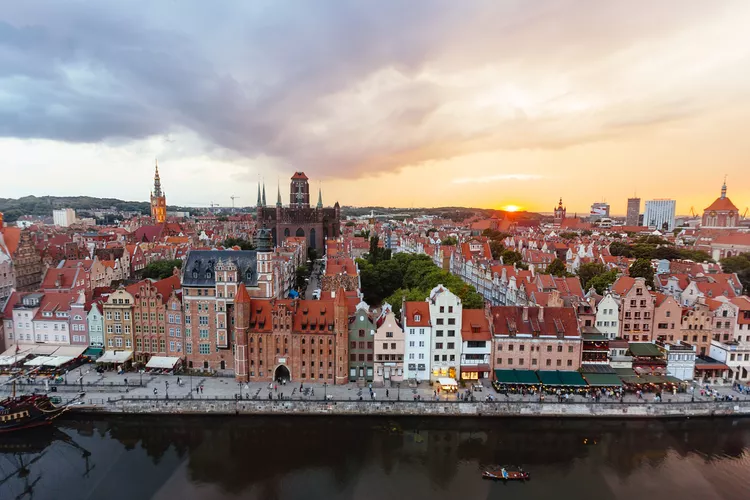Summary of Gdansk Attractions
Gdansk, located in northern Poland, is a vibrant city that flourishes thanks to its maritime heritage. In Gdansk, you will find intriguing historical sites such as a colossal medieval harbor crane, significant monuments like the one dedicated to fallen shipyard workers, and an abundance of beautiful amber adorning its beaches. Enjoy spectacular views of this Polish gem from atop St. Mary’s Church, explore Gdansk’s remarkable gates, and immerse yourself in its rich cultural museums.
Harbor Crane
:max_bytes(150000):strip_icc():format(webp)/gdansk-crane-gate-and-old-town-reflections-584685979-5c78137346e0fb0001edc7b2.jpg)
Upon entering the Green Gate, you’ll arrive at the banks of the Motlawa River. The initial view from the bridge introduces you to life along Gdansk’s picturesque riverfront, but the remarkable medieval harbor crane quickly captures attention. Built in 1444, this crane stands as a historical testament to Gdansk’s deep maritime roots. Visitors can marvel at the crane’s colossal structure while exploring its inner mechanisms, showcasing its rich engineering history.
Banks of the Motlawa River
:max_bytes(150000):strip_icc():format(webp)/view-of-buildings-from-across-a-lake-in-gdansk--poland-172259281-5c7816b646e0fb0001edc7b5.jpg)
Strolling along the banks of the Motlawa River reveals an array of charming seafood restaurants, vibrant vendors selling amber and crystal, and shops with nautical-themed products. This lively waterfront area is perfect for enjoying the scenic beauty of Gdansk, including floating cafes and fascinating maritime museums showcasing historic vessels.
High Gate or Upland Gate
:max_bytes(150000):strip_icc():format(webp)/uplands-gate--gdansk--poland-180269519-5c78170ac9e77c000136a6c4.jpg)
The High Gate, also known as the Upland Gate, is a striking gray-brick structure that once formed part of Gdansk’s defense system. Serving as a significant entry point along the Royal Route, this historic landmark dates back to the 16th century. Its peculiar leaf-like pattern of bricks adds to its unique aesthetic, while the crests representing Gdansk, Poland, and Prussia grace its upper section.
Long Street
:max_bytes(150000):strip_icc():format(webp)/the-long-lane-street-in-gdansk-523161192-5c781756c9e77c0001d19cb4.jpg)
Known as “Dluga” on Polish maps, Long Street is the heart of Gdansk’s Main Town, home to numerous museums, stunning architecture, lively cafes, and exclusive shops. This bustling street provides countless opportunities for cultural exploration and memorable photography.
Main Town Hall and History Museum
:max_bytes(150000):strip_icc():format(webp)/old-town-hall-of-gdansk--poland-1016734584-5c78179346e0fb00019b8d5e.jpg)
Main Town Hall stands prominently along Long Street and is an iconic element of Gdansk’s skyline visible from various vantage points. This reconstructed medieval structure has been transformed into a history museum where visitors can explore Gdansk’s intriguing past through compelling exhibits that showcase art, weaponry, and historical artifacts.
St. Mary’s Church
:max_bytes(150000):strip_icc():format(webp)/aerial-view-of-gdansk--poland-884732762-5c78199846e0fb00011bf27a.jpg)
St. Mary’s Church holds the title of the largest brick church in the world. A journey to the roof provides breathtaking views of Gdansk. However, before climbing the more than 400 steps, visitors should appreciate the church’s interior, which is home to historical relics, including a wooden Pieta, a 500-year-old astronomical clock, and a detailed triptych of the Last Judgement.
Royal Chapel of St. Mary’s
:max_bytes(150000):strip_icc():format(webp)/poland--pomerania--gdansk--royal-chapel-in-fron-tof-st--marys-church-909592122-5c7819e746e0fb00019b8d61.jpg)
Constructed by King Jan III Sobieski in the Baroque style, the Royal Chapel of St. Mary’s Church features an eye-catching sherbert-colored facade with ivory columns that contrasts dramatically with the dark brick of the church itself.
Monument to Fallen Shipyard Workers
:max_bytes(150000):strip_icc():format(webp)/last-preparations-to-ecs-museum-opening-in-gdansk--poalnd-525245730-5c781a5f46e0fb0001edc7b7.jpg)
The northern section of Gdansk’s Old Town is steeped in contemporary history. Once known as the Lenin Shipyards, the site was the epicenter of a significant workers’ uprising, leading to the formation of the trade union, Solidarnosc, in the 1970s. This movement fought for workers’ rights and ultimately secured governmental recognition. The struggles and triumphs of these workers are memorialized by a monumental structure alongside various plaques scattered around the shipyard gates.
Great Mill
:max_bytes(150000):strip_icc():format(webp)/great-mill-and-st--catherine-church-in-gdansk--poland-484191904-5c781ab346e0fb000140a3d9.jpg)
Once the largest working medieval mill in Europe from 1350 to 1945, the Great Mill now houses a shopping center. Visitors can explore artifacts uncovered during excavations at this historic site. Originally, this structure functioned as a flour mill, granary, and bakery, with its exterior still showcasing an operational water wheel.
Old Town Hall
:max_bytes(150000):strip_icc():format(webp)/oldTownHall-5c781919c9e77c0001d19cb5.jpg)
Explore the Old Town Hall to discover remarkable 17th-century interiors and insights into the cultural heritage of the Baltic Sea through the Baltic Sea Culture Center. This historical site represents the past when Gdansk’s old town and main town were distinct entities, highlighting a rich tapestry of history and architecture.




